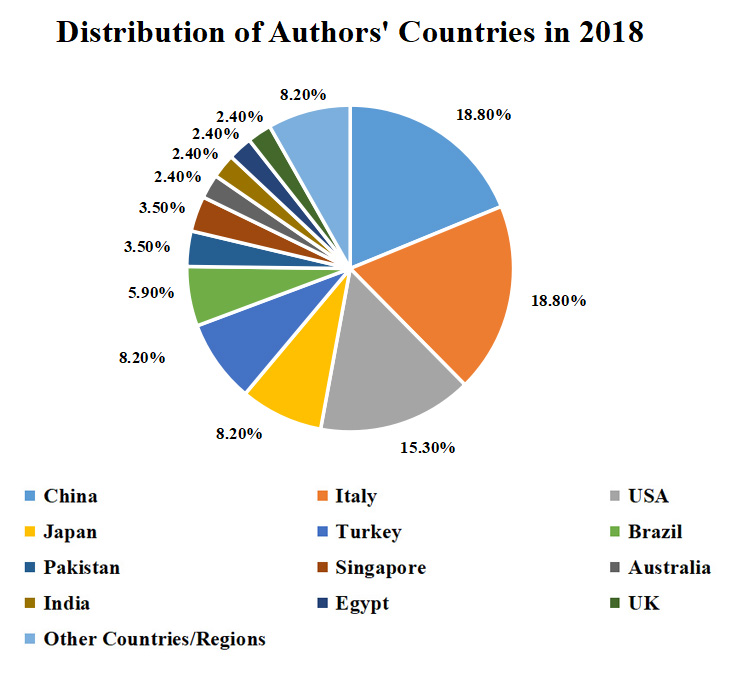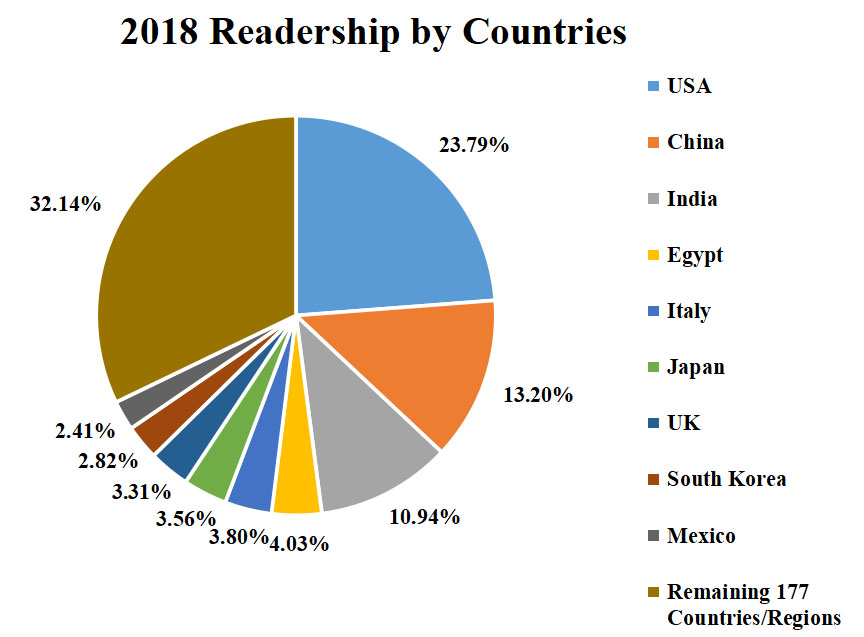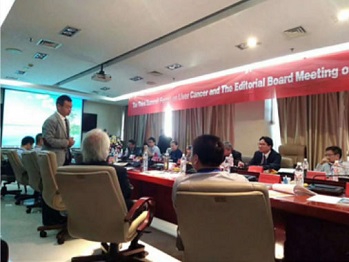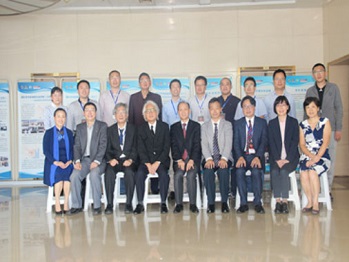Hepatoma Research: Annual Report of 2018
On January 15, 2019, the Annual Report meeting of Hepatoma Research (HR) was held in Xi'an, China. HR Editorial Office gave a report on the development of the journal over the past year, which read as follows.
Apparently, the biggest change of our journal is the launch of its newly designed website on December 4, 2018, which is the third overall upgrading since 2015. The new website has won a lot of praises from our readers, and they also paid much attention to the high-quality articles published in our journal in the year of 2018.
HR published 75 articles mainly from China, USA, Italy and Japan in 2018. The most obvious improvement is that the number of articles has nearly doubled compared with 38 published articles in 2017. The quality of articles in 2018 has greatly improved thanks to the established of more special issues and a more scientific, rigorous peer-review process. The distribution of the authors' countries in 2018 is shown as below:

By December 31, 2018, all papers had been read 890,516 times and downloaded 33,624 times. It has been read 73,177 times and downloaded 4,959 times in 2018. Compared with 2017, the reading quantity increased by 27,948 and the download quantity increased by 912. The maximum reading quantity for a single article is 3768 times, and the maximum download quantity for a single article is 246 times. Regarding the citation, all published articles were cited 77 times in 2018 (searched by Web of Science). Top cited articles and top downloaded articles in recent 2 years can be found below:
(Top cited papers in 2017 and 2018)
| Title | Type | Country | Published Year |
|---|---|---|---|
| Intrahepatic cholangiocarcinoma: review and update | Review | Italy | 2018 |
| Direct antiviral therapy for hepatitis C and hepatocellular carcinoma: facing the conundrum | Review | Italy | 2018 |
| Molecular mechanism of hepatocellular carcinoma | Review | South Korea | 2018 |
| Oxidative stress and hepatocarcinogenesis | Review | USA | 2018 |
| Understanding the inflammation-cancer transformation in the development of primary liver cancer | Review | China | 2018 |
| Immunotherapy for hepatocellular carcinoma: the force awakens in HCC? | Review | USA | 2017 |
| Management of advanced hepatocellular carcinoma: review of current and potential therapies | Review | Egypt | 2017 |
| Updates on hepatorenal syndrome and strategies bridging to liver transplantation | Mini-Review | China | 2017 |
| Advances in the diagnosis and treatment of liver fibrosis | Review | China | 2017 |
| Radiological diagnosis of hepatocellular carcinoma in non-cirrhotic patients | Review | Spain | 2017 |
(Top downloaded papers in 2018 and 2017)
The progress of journals has been recognized by more professionals. Nine new Editorial Board Members from USA, Japan, Italy, China, and Turkey joined our journal in 2018: Prof. Osamu Yokosuka (Chiba University, Japan, Former President of APASL), Prof. Seung Kew Yoon (The Catholic University of Korea, Korea), Prof. Clara Balsano (University of L'Aquila, Italy), Prof. Necati Örmeci (Ankara University Medical School, Turkey, Executive Council of APASL), Prof. Bruno Nardo (Alma Mater Studiorum Università di Bologna), Prof. Gabriele Missale (Azienda Ospedaliero-Universitaria di Parma), and other experts from University of Iowa, USA and China, etc.
The readership of HR expanded from 168 countries and regions in 2017 to 186 in 2018. The detailed distribution can be seen in the following chart:

Furthermore, the Third Editorial Board Meeting of HR was held in Xi’an on September 22. There were 18 editorial board members with top academic backgrounds attending the meeting, including: Prof. Guang-Wen Cao (Naval Medical University), Editor-in-Chief; Prof. Masao Omata (University of Tokyo), Honorary Editor-in-Chief; Prof. Kai-Chun Wu (Fourth Military Medical University), Associate Editor; Prof. Osamu Yokosuka (Chiba University), Associate Editor; Prof. Kenneth Siu Ho Chok (University of Hong Kong), Associate Editor, etc. Prof. Cao held a discussion on the journal development and hot topics in liver cancer. The progress made in the past year has been highly praised by Prof. Masao Omata, who expressed his confidence in the promising future of HR.


In 2018, we succeeded in carrying out the plan made at the beginning of the year and achieved gratifying achievements recognized by experts in the field of liver cancer research. We'd like to express our sincere gratitude to the experts for their contributions to peer review in the past 3 years on behalf of the editorial team. (Please kindly find detailed information from Reviewer Acknowledgments.)
We firmly believe that the journal will achieve more remarkable development in 2019 with the joint efforts by all members of HR.
Respectfully Submitted by the Editorial Office of Hepatoma Research.




